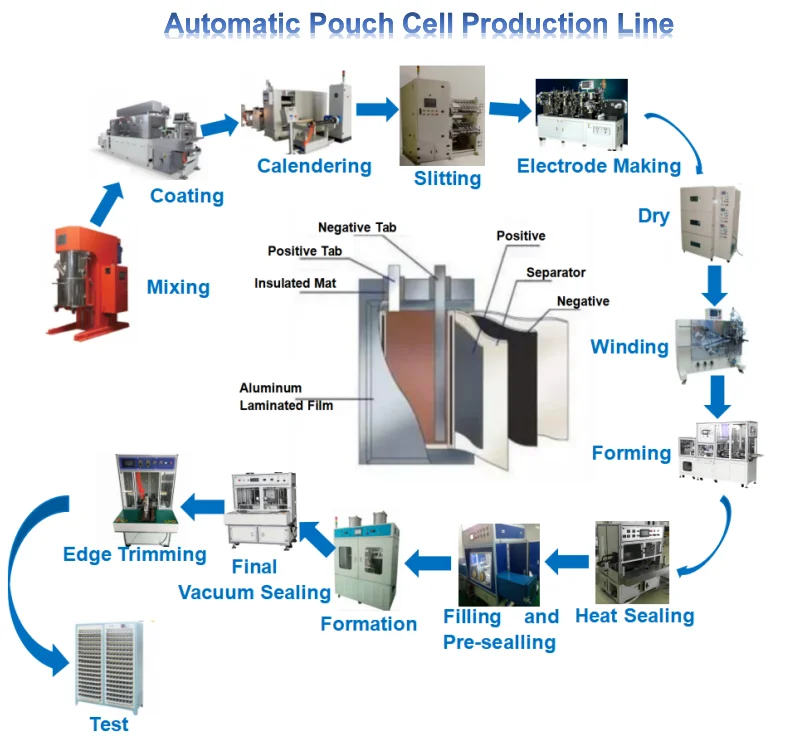- Battery Manufacturing Equipment
- Battery Laboratory Assembly Equipment
- Battery Pack Assembly Equipment
- Sodium Ion Battery Manufacturing Equipment
- Solid State Battery Assembly Line
- Dry Electrode Assembly Equipment
- Supercapacitor Assembly Equipment
- Perovskite Solar Cell Lab Equipment
- Li ion Battery Materials
- Ni / Al / Cu Metal Foam
- Customized Electrode
- Cathode Active Materials
- Anode Active Materials
- Coin Cell Parts
- Lithium Chip
- Cylindrical Cell Parts
- Battery Current Collectors
- Battery Conductive Materials
- Electrolyte
- Battery Binder
- Separator and Tape
- Aluminum Laminate Film
- Nickel Strip/Foil
- Battery Tabs
- Graphene Materials
- Cu / Al / Ni / Stainless steel Foil
- Battery Laboratory Equipment
- Li ion Battery Tester
- Battery Safety Tester
- Battery Material Tester
- Film Coating Machine
- Rolling Press Machine
- Electrode Mixer
- Coin Cell Crimping Machine
- Coin Cell Electrode Disc Punching
- Pouch Cell Sealing Machine
- Pouch Cell Stacking Machine
- Pouch Cell Forming Machine
- Pouch Cell Ultrasonic Welder
- Pouch Cell Electrode Die Cutter
- Cylinder Cell Sealing Machine
- Cylinder Cell Grooving Machine
- Electrode Slitting Machine
- Cylinder Cell Winding Machine
- Cylinder Cell Spot Welding Machine
- Electrolyte Filling
- Type Test Cell
- Other Battery Making Machine
- NMP Solvent Treatment System
- Vacuum Glove Box
- Lab Furnaces
- Ball Mill
- Hydraulic Press
- Laboratory Equipment
- 2023-03-30
Prismatic cell production plants are specialized facilities designed to manufacture prismatic lithium-ion batteries for use in various electronic devices. The process involves several stages and requires specialized equipment and skilled personnel.
Production Process:
1. Electrode Manufacturing: The first step involves preparing the electrodes that will be used in the battery. This involves coating a conductive substrate with a thin layer of active material. The substrate can be made of copper, aluminum, or nickel.
2. Electrode Cutting and Slitting: After the electrodes are prepared, they are cut into the desired shapes and sizes. They may also be slit to create tabs for connecting the electrodes to the battery terminals.
3. Electrode Stacking: The next step is to stack the electrodes and separators in a predetermined sequence to form the battery cell. The separator is a thin layer of porous material that prevents the electrodes from touching each other and short-circuiting.
4. Cell Formation: Once the electrodes and separator are stacked, the cell is assembled using specialized equipment that controls the temperature, humidity, and pressure. This process helps to activate the active material in the electrodes and improve the performance of the battery.
5. Battery Assembly: After the cells are formed, they are assembled into a complete battery pack. This involves connecting the cells in series or parallel, depending on the desired voltage and capacity. The pack is then encased in a protective housing to prevent damage and ensure safety.
Equipment:
1.Electrode coating machine: Used for applying the active material to the substrate to create the electrodes.
2.Battery Electrode Slitter: Used for cutting the electrodes into the desired shape and size.
3.Stacking Machine: Used for stacking the electrodes and separator to create the cell.
4.Cell Formation Equipment: Used to activate the active material in the electrodes and improve battery performance.
5.Battery Assembly Line: Used for assembling the cells into a complete battery pack.
Usage Precautions:
1.Strict quality control measures should be implemented throughout the production process to ensure the safety and reliability of the batteries.
2.Personnel should be trained on the proper handling and disposal of hazardous materials used in the production process, such as solvents and electrolytes.
3.Regular maintenance and calibration of the equipment is essential to ensure accurate and consistent results.
4.Safety protocols should be established and to prevent accidents and injuries in the workplace.
In conclusion, prismatic cell production plants are essential for manufacturing high-performance lithium-ion batteries for use in a wide range of electronic devices. The production process involves several stages and requires specialized equipment and skilled personnel. Strict quality control measures, proper handling of hazardous materials, regular maintenance of equipment, and adherence to safety protocols are crucial for ensuring the safety and reliability of the batteries produced.
-
 Automatic Cylinderical Battery Electrode Winding Machine
Read More
Automatic Cylinderical Battery Electrode Winding Machine
Read More
-
 100-200L Double Planetary Vacuum Mixing Machine for Lithium Battery Slurry
Read More
100-200L Double Planetary Vacuum Mixing Machine for Lithium Battery Slurry
Read More
-
 Large Heating Roller Press Machine Calender For Li ion Battery Production Line
Read More
Large Heating Roller Press Machine Calender For Li ion Battery Production Line
Read More
-
 Large 3 Rollers Battery Electrode Film Intermittent Coating Machine for Pilot Production Line
Read More
Large 3 Rollers Battery Electrode Film Intermittent Coating Machine for Pilot Production Line
Read More
-
 512 Channel 5V3A Battery Grading Machine/Battery Charge Discharge Machine Tester
Read More
512 Channel 5V3A Battery Grading Machine/Battery Charge Discharge Machine Tester
Read More
 ru
ru


 cindy@tmaxcn.com
cindy@tmaxcn.com David@battery-equipments.com
David@battery-equipments.com Wechat:13506084915
Wechat:13506084915